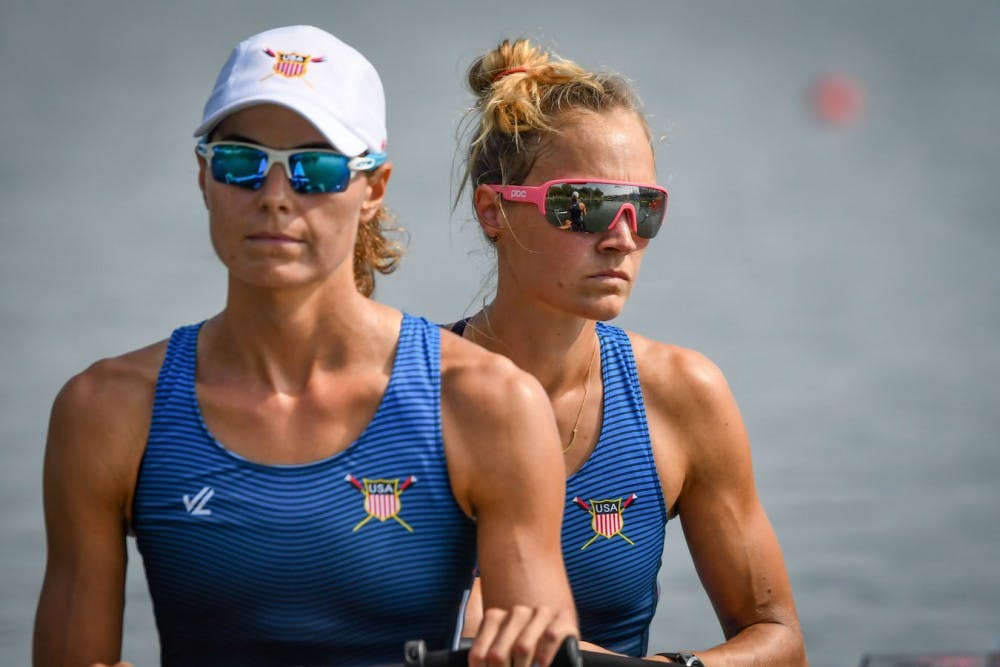Margaret Bertasi ’14 doesn’t want to hear about her size.
The five-foot-nine, first team All-Ivy League honoree helped Princeton women’s open weight rowing to 2013 and 2014 Ivy League titles. She’s represented the United States as a member of five separate national teams. She just returned a world champion from Linz-Ottensheim, Austria.
How did she become one of the Shea Rowing Center’s brightest stars?
Because head women’s open weight coach Lori Dauphiny recruits for “heart, not height.”
Bertasi, who calls herself a “huge winter-sports woman,” grew up a dedicated ski racer. Her family’s 2006 move to London left her with a notable lack of skiable mountains; she found herself in the market for a new sport, and followed her elder sister to the boathouse.
Her first, 2009 appearance on the United States junior national team — and subsequent third-place finish — made Bertasi realize that crew was more than just something she loved. It provided her with a world of possibility. She started sending messages to college coaches — and started getting identical messages back.
“A lot of them told me I’d fit in better as a lightweight,” she said. “A lot of them told me I’d have to put on 15 pounds or they wouldn’t even look at me.”
It didn’t faze her.

“There were no weight classes in England or on the junior national team,” she said. “I was rowing well against women who were a lot bigger than me. I figured if I could do that on the national level in England and the international level in the United States, I could do it in college. And plus,” — she laughed — “I wanted the competition.”
She found it at Princeton, where Bertasi’s teammates dwarfed and outweighed her. On the water, she lacked some of their leverage and length. On the erg, she couldn’t compete with their scores. She was, in her own words, “never a superstar.” Still, she never gave up.
And that, to head coach Dauphiny, is what was so remarkable about her.
“It takes time for me to get to know the student-athletes,” she said, “but right from the start I could definitely sense Margie’s willpower. She worked away and fought really hard until she was in the first boat, making a real impact on the fastest boat in the boathouse. She’s fierce, determined, fearless.”

Each year in the boathouse, Bertasi accomplished more and more. But each year on campus, she felt a growing sense of dread.
“Literally everyone I knew,” she said (echoing Clare Gallagher ’14), “was going the New York City banking route. I really felt the pressure to do it too — I went to all the information sessions, all the one-on-one stuff on campus. But I could just feel that my heart wasn’t in it.”
Banking was off the table. And in the absence of an invitation to try out for the Under-23 National Team — her height had, again, proved a barrier — professional rowing was too. So Bertasi, a history concentrator with certificates in environmental studies and energy technology, accepted a sustainability consulting job in Singapore. Come graduation, she readied herself to bid farewell to three staples of her Princeton Athletics career: Wall Street, the water, and the West.
Not so fast.
With two months to kill before her job started, Bertasi got bored quickly. She decided that, invitation or not, she was showing up to training camp. She raced her way to a spot at the Varese, Italy U-23 world rowing championships, where the result — first in the B final, seventh overall — was “unfortunate.”
For the second time, Bertasi hung up her rowing hat. She moved to Singapore in the fall of 2014 and immersed herself fully in the professional world.
But something kept nagging at her: come the 2016 Olympics, she’d watch scores of her teammates and her longtime opponents represent their countries. And if they performed well, she’d always wonder if she could have, too. Would she regret not trying?
Short answer: yes.
So she quit her job, packed her bags, and traded in Singapore for New Milford, Connecticut, to train full-time.
At her first race back, the Elite National Championship, Bertasi placed third. The two women who beat her were both — naturally — larger than her. They also both trained in Southern California.
“If these people were faster than me,” she said, “I needed to train with them every day.”
She repacked her bags and relocated — first to Southern California, then to Oakland, then to Boston. She set her sights on the Olympics; on making sure that come 2020, she can watch with no regrets.
A 2017 stint at the heavyweight quad selection camp didn’t pan out. Neither did her time at the heavyweight doubles selection camp. No matter the city or the situation, Bertasi found herself facing the same challenges she always had.
“Every time,” she said, “I was basically told my erg wasn’t fast enough. And I realized that will always be the case for me. There will always be a woman who is taller and stronger than me. No matter how hard I work, there will always be reasons not to have me in a heavyweight boat.”
So last spring, for the first time, Bertasi gave up. She quit rowing completely, vowing to simply work out like a “normal person.”
And within a week, she started noticing something strange: pounds were slipping off. She, who had sat in the 150-pound range during her professional career, was veering closer and closer to lightweight (sub-130-pound) territory.
“Why not?”
So began Bertasi’s second act — one that, in just the past year, has seen her place fourth at nationals, earn a spot on the United States national team, and, evidently, win a world championship in the lightweight double. Her hopeful next stop: Tokyo, and then a return to the professional world.
“I almost didn’t let myself do this,“ she said. “When I made the decision to switch from a conventional path to an unconventional one, I was caught up with what my peers would think of me. Rowing isn’t a spectator sport. There’s no money in it; it’s not a life of glory. But I’m doing what I love.”
Bertasi knows that her path isn’t an option for most Princeton students. But she wants to stress that the underlying theme of it is.
“The unconventional option isn’t always the right one,” she said. “But I wish that more students were comfortable doing what they’re excited and happy about. That’s all that matters. It’s taken me a really long time to realize that.”








